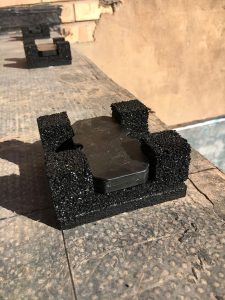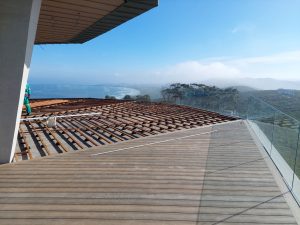Green Flooring Solutions with Waste Rubber Tires
Mathe Group’s Hammarsdale facility recycles approximately 1,000 radial truck tyres per day to produce 45 tons of rubber crumb, is a pivotal export hub.
Although many of its products are distributed internationally, the innovative rubber flooring solutions that helped establish this growing company in the first place, continue to highlight its global reach and position it as a South African leader in green building solutions.
Dr Mehran Zarrebini, CEO of Mathe Group, points out that strategic partnerships have helped the company to spread its wings whilst also helping reduce South Africa’s hazardous build-up of used tyres.
The latest collaboration with The Flooring Connection (TFC) – which brings together Instafloor SA, Instafloor UK, and Van Dyck – now spans several years. Van Dyck manufactures the acoustic products at its production facility in Hammarsdale.
“Our initial engagement involved providing acoustic underlay products. Through our partnership with Instafloor South Africa, they have also procured advanced acoustic solutions. Given the specialized nature of these products, TFC plays a critical role in liaising closely with end clients and offering essential technical support,” Zarrebini explains.
Jonathan Bodley, head of The Flooring Connection (TFC), says they are dedicated to helping transform the African construction industry, promoting flooring products that align with the circular economy for renovations and new building projects.
“Partnering with Dr Zarrebini of the Mathe Group and Van Dyck (PFE) was a natural choice. Our partnership is grounded in our shared goal of greening the flooring industry,” he says.
He says that because all Van Dyck’s products are tested to international specifications, his company can market and export products made locally that can compete against less sustainable alternatives on both quality and cost.
He points out that product development is a key shared goal. “TFC has seen progression in our offerings in terms of innovative uses of our products and new developments. We take pride in how the versatility of these products showcases African creativity and innovation.”
InstaCradle rubber crumb subflooring cradles were initially used for raised acoustic flooring in the sports and office environment to absorb impact force and sound. Decking applications followed, specifically in situations where waterproofing needed to be protected.

With support from PFE, the EcoPaver Cradle was developed for external, permeable paving, allowing for easy water runoff and the creation of water reticulation systems. This has since been used in several buildings.
“Our rubber crumb underlays, long-used in the flooring industry, are now being used as acoustic barriers under standard cement screeds and as low profile solutions for self-leveling screeds”
“These products have proven remarkably versatile with contractors finding unexpected ways to utilize them. For example, InstaCradles are now used in acoustic recording studios, to install wall cladding and even support roofing joists. In addition to rooftop decks, the cradles are used to hold the feet of solar geysers.
Dr Zarrebini adds that ongoing research and development continue to yield innovative products that are nearing completion, including acoustic solutions for high-performance gymnasiums and adhesive-free flooring systems.
Bodley and Zarrebini believe that, although South Africa is still relatively new to the modern green building wave, demand for and awareness of green building products such as these are growing.

“The South African market exhibits a promising trajectory for the adoption of our products, particularly within the built environment where there is a noticeable shift towards sustainable building solutions. However, the pace of adoption in South Africa typically lags markets like the UK, where legislation and regulatory frameworks more actively drive sustainable innovation,” Zarrebini explains.
He is nevertheless confident that integrating recycled rubber into flooring solutions offers multifaceted benefits, including a significant reduction in the dependence on imported raw materials like virgin rubber which, ultimately, contributes to a more sustainable manufacturing ecosystem.
This sustainability goal is prized by both parties
“Our future expansion plans will accommodate the dual objectives of supplying rubber crumb to external customers and leveraging it for the valorization in our locally manufactured acoustic products. This strategy aligns with our commitment to sustainability and the optimization of resource use within our production processes,” Zarrebini says.
“The recycled rubber crumb product range attains the highest acoustic performance standards whilst having a positive environmental impact. Looking ahead, sustained collaborations with PFE are anticipated. We have seen much potential in the South African sports flooring market. Above all, we aim to increase demand for recycled rubber crumb products, stimulate government support for recycling efforts, and foster a sustainable solution to environmental challenges,” Bodley concludes.
You can return to the main Market News page, or press the Back button on your browser.

